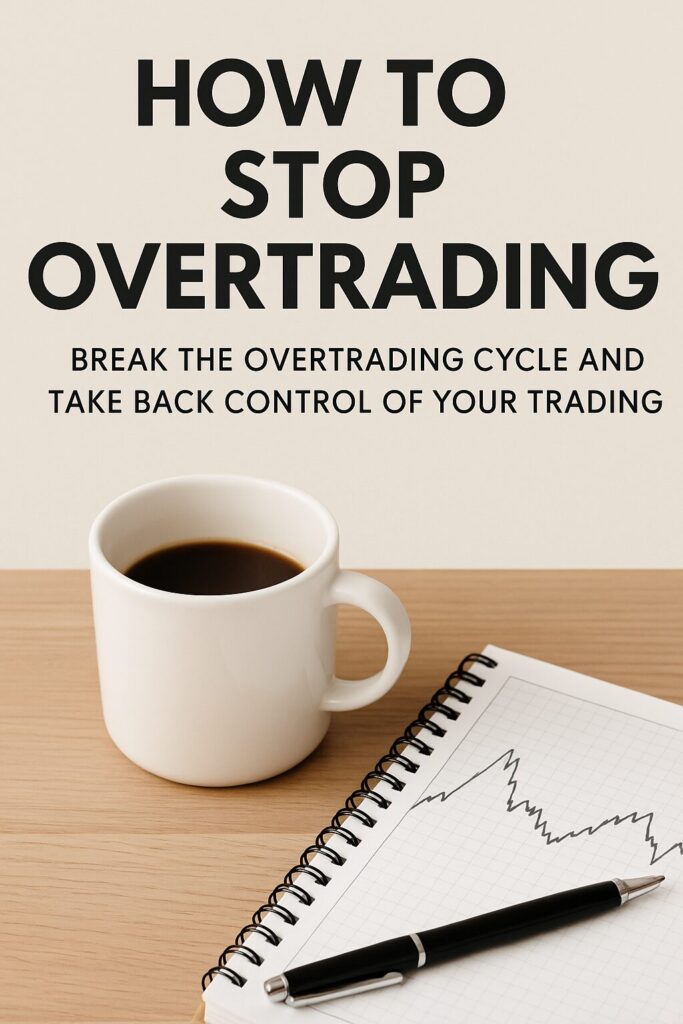How to Stop Overtrading and Stay Funded: What Every Trader Needs to Know

How to Stop Overtrading and Stay Funded
A Trader’s Guide to Discipline, Structure, and Funded Success
Struggling with overtrading and failing prop firm evaluations?
This focused eBook is your practical solution — built for funded traders, evaluation candidates, and anyone tired of letting emotion take control of their account.
✅ What You’ll Learn:
- Why overtrading happens (and how to stop it for good)
- The 7 most common emotional traps that destroy consistency
- A proven 5-rule discipline framework used by successful prop traders
- How to protect your funded account with fewer, higher-quality trades
- What to do after a rule break — without spiraling into losses
📘 Inside the Guide:
- 8 structured, easy-to-follow chapters
- Self-assessment checklist: Are you overtrading?
- Real case studies comparing funded vs overtrading behaviors
- A full 30-Day Trader Discipline Challenge
- Clean, printable format (US Letter) — binder-ready
Fix Overtrading in 30 Days — and stay funded with fewer trades, better decisions, and total control.
6 Real Reasons Traders Are Searching “How to Stop Overtrading” — And Why Most Still Fail
Traders don’t Google “how to stop overtrading” because they’re bored.
They search it because they’re frustrated, burned out, and desperate to finally fix a pattern that’s costing them real money — and funding.
They Think More Trades = More Opportunity
In theory, more trades should mean more chances to profit.
But in real-world trading — especially under prop firm rules — that logic falls apart fast.
When you start stacking trades on top of trades, two things happen:
- You dilute your edge by entering lower-quality setups
- You expose your account to emotional decision-making
Most traders who overtrade aren’t doing it because they see real opportunities. They’re doing it because they feel like they should be active.
The truth? Consistency doesn’t come from activity — it comes from selectivity.
And that’s a lesson many traders learn the hard way.
Why Prop Firm Traders Are Especially Vulnerable
Prop firm traders often feel pressure to “prove themselves” quickly.
There’s a daily clock ticking. A profit target to hit. A limited number of days to show performance.
That urgency creates a mindset where trading becomes a task, not a decision.
- “I need to make something happen today.”
- “I don’t want to waste a session.”
- “I’m here to trade — so I should be trading.”
This is where discipline collapses.
The need to be productive overrides the need to be precise.
But trading isn’t about doing more — it’s about doing the right thing at the right time.
Overtrading almost always signals a lack of structure, not a lack of skill.
They Can’t Recognize the Emotional Triggers
Overtrading is almost never a strategy flaw — it’s a response to emotion.
Think about the last time you broke your trading rules:
- Was it after a loss you wanted to “recover”?
- Was it after a big win that made you feel invincible?
- Was it after missing a move and chasing the next setup?
These are emotional traps.
They don’t show up on charts — but they show up in your behavior. And the worst part?
Most traders don’t even realize it’s happening until it’s too late. That’s why Google searches like “how to stop overtrading” are so common. It’s not because people don’t know their rules — it’s because they keep breaking them anyway.
They Don’t Have a System That Enforces Restraint
The most successful traders — especially in funded environments — trade with built-in structure:
- A max number of trades per day
- Specific hours when they’re allowed to trade
- A checklist before entering any position
- A break between trades to reset emotionally
- A written journal to review performance weekly
Without systems like these, you’re relying on willpower.
And when you’re under pressure, tired, or emotional — willpower fails.
Most overtrading problems aren’t solved with more knowledge — they’re solved with better systems.
And that’s exactly what most traders are missing.
They’re Looking for a Quick Fix — Not a Behavior Shift
Here’s the uncomfortable truth:
You don’t stop overtrading by reading a tip, watching a YouTube video, or slapping on a new indicator.
You stop overtrading by changing how you trade — and how you think about trading.
That means:
- Giving up the need to always be in a trade
- Respecting your rules even when it hurts
- Learning how to pause instead of react
- Building discipline that outlasts emotion
But that shift doesn’t happen by accident.
It requires intention, reflection, and the right tools.
Unfortunately, many traders are searching for a fast answer to a slow habit.
And that’s why they keep Googling “how to stop overtrading” every month — without real change.
6. They Don’t Know Where to Turn for a Real Solution
The internet is full of generic advice:
“Be patient.” “Stick to your rules.” “Wait for your setup.”
All good advice — but none of it helps if you don’t know how to implement it.
What most traders need is a real-world framework they can follow every day — especially if they’re in a prop firm evaluation or managing a funded account.
They need a clear system. A printable process. A structure they can rely on when discipline starts to slip.
That’s why we created a solution.